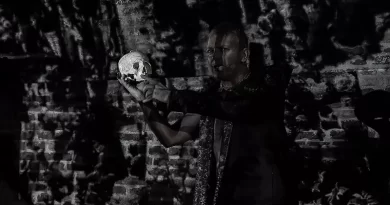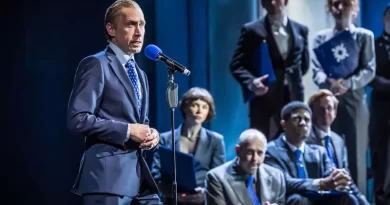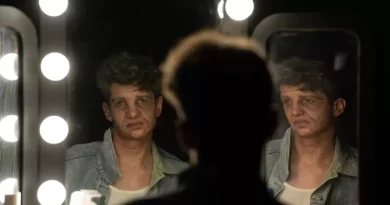Polis Theatre Festival, May 2023
Sasho Ognenovski reports from Ravenna, Italy
Theatre has only one future and that is a process by which modes of expression become increasingly sophisticated. Stage art does not differentiate between people and places; it distinguishes between messages and attitudes, opens new ways of thinking and behaves pragmatically. My abiding impression of the Polis festival is its boldness and ability to inspire. And that is a theatrical language that is future-proof.
For six years now, this innovative theatre festival has been active in research and identification of significant trends. Most notably, Davide Sacco and Agata Tomšič, (founders and artistic directors of theatre company ErosAntEros) have, since early in 2010, been following an engaged form of theatre that does not compromise on the aesthetic values of the form. They operate in a realm that covers the past, the present and theatre’s very origins to connect stage drama with life. At the same time, there is protection of the imagination as a sacred mechanism that can transform reality.
This pair of theatre makers have been part of the productions of several important theatre institutions including ERT – Teatro Emilia Romagna, Ravenna Festival, TNL – National Theater of Luxembourg, Teatro della Toscana, Teatro Piemonte Europe, Teatro della Tose and Teatro Festival in Campania.

Libia.
Photo credit: Dario Bonazza.
Since the beginning of their collaborative work they have been involved in significant international projects. In 2018, they founded the Polis Theatre Festival which allows them to host artists of international importance. They can also implement participatory projects with strong involvement of local people (non-actors) to raise awareness of pressing current issues. Lay participants become an empowered part of the projects; they think deeply about their roles and overall significance. This, the sixth edition of the festival, is focused on Balkan theatre and notably the thematic movements and motivations of a region that has been a political powder keg for so long.
In addition to the Balkan focus, this edition of the Polis festival offered many interesting theatrical performances by artists in the section entitled “Visionaries”. The section included art installations as well as theatre projects. I am thinking of the Lumen Theatre Group with the project Like Stone, Water, Snow directed by Elisabetta Carozio and performed by Gabriele Genovese.
Notable also was the project The Story of Eurydice by Chiara Orefice with direction by Luisa Guarro. I was struck by Die as a Country based on the book I Die as a Country by Dimitris Dimitriadis, directed and performed by Gemma Hansson Carbone. Also of great note was a play — a theatrical experiment that had its premiere at this festival — Roberta Biagiarelli’s independent project Srebrenica directed by Simona Gonella. The play This Beautiful Non-Warrior was performed by Teatro di Roma with direction by Marco Ceccotti; it appeared as part of the so-called “Inbox” section.

Damned Be the Traitor to His Homeland!
Photo credit: Ziga Koritnik.
One of the most worthwhile segments of this festival is the time spent on meetings with the artists appearing in the projects and the exchange of ideas that follows. Moderators, theatre critics, actors, regular theatre-goers all contribute impressively. This strengthens the reception of the works.
The Balkan segment of the festival consisted of the performances of Kosovo and Slovenia, as well as the performance The Husin Miner by the Bosnian artist Branko Shimich. We also saw Burnesha (The Sworn Virgin) which is based on a play by Jeton Neziraj with direction by Erson Zymberi. The play deals with the interesting phenomenon of women who have decided to spend their lives as men. Through the performances, it analyzes what “civilization” and “uncivilization” mean in other words a world created by tradition and beliefs in gender currents. The powerful performances of Tringa Hasani, Semira Latifi and Kushtrim Qerimi inspired the debate that followed with theatre critic Anna Maria Monteverdi and the artists. Many delicate topics opened up about the anthropological aspects of this subtle phenomenon.
The debate on the situation in Balkan theatre was moderated by theatre analyst and critic Natasha Tripney. Prominent in this session was Ivan Medenica, a theatre expert and professor at the faculty of dramatic arts in Belgrade. Contributors included Dubravka Vrgoc, a former artistic director of the Croatian National Theatre in Zagreb. At this intense debate, both wounds and sources of inspiration were revealed. Discussions covered those perspectives of theatre that are continuously influenced by national and political turbulence as well as inevitable misunderstandings.
A significant aspect of the Balkan focus of the Polis festival was the two plays by the Slovenian Youth Theater from Ljubljana, Damned Be the Traitor to His Homeland! directed by Oliver Frljich, and The Game by the young director Zhiga Divjak.
By dealing with the post-Yugoslav syndrome and emigrant suffering along the borders of Slovenia and Croatia, these plays also opened up figurative if not actual wounds of the countries that have just got out (Slovenia, Croatia) or those that are still drowning in the prejudices of the transition period (North Macedonia, Serbia).

PPP, I Represent You Albania.
Photo credit: Klaus Martini.
In this part of the festival, the debates with the critic Gianni Manzella were extremely interesting, and one of the relevant installations or rather performances was The Husin Miner by conceptual artist Branko Shimich. It is a performance that draws a historical parallel between the emigrants of the beginning of the twentieth century and the emigrant Odyssey of the twenty-first century.
Speaking of emigrants, I should also like to highlight Klaus Martini’s excellent monodrama PPP, I Represent You Albania, an impressive performance which was a co-production with Mitelfest. It talks about the emigration syndrome from an autobiographical point of view while also showing the author’s interest in the films of Pasolini. All in all, it is a performance that presents emigration as an eternal achievement where family tradition is a foundation that hurts but also inspires.
The former Yugoslavia is an inspiration for many theatre projects and the transitional period is always pliable and productive historical material that can be researched to good effect in terms of creating art. Of relevance here was the play Enemy (Crossing the Balkans). It is based on a concept by Melodie Lasselin and Simon Capelle. Performed in the city museum of Ravenna, it offered us a cross-section of the 30-year traumas of the countries that resulted from the bloody breakup of Yugoslavia. Lasselin, Camille Dagen and Léa Perat dived into that nationalistic mud to throw up the dregs of the bloody misunderstanding that still simmers atop the graves of the innocent victims of the war of the Nineties.

Enemy (Crossing the Balkans).
Photo credit: Martina Pozzan.
In conclusion, Polis is a festival that presents the audience with both dilemmas and messages. That is surely a valuable twin offering. The festival’s ongoing research will I believe produce new and topical ideas about theatrical expression in the near future. Few will be able to remain indifferent in their attitude to this. And speaking of current affairs, I should like to stress that these theatre projects pulsate with complexity and engagement. We are lucky enough to experience the work of artists whose thought processes are transparent and powerful. It seems that the future of theatre lies in wisely created building blocks such as this festival. Discovering these materials —and they may be tucked away in events of this kind — we discover the essence of the future of theatrical art.









